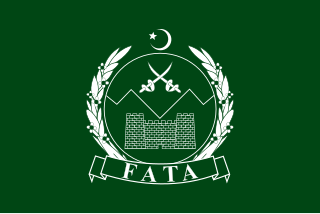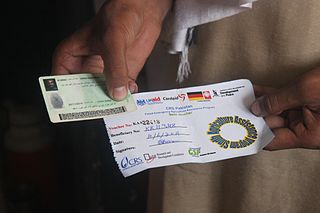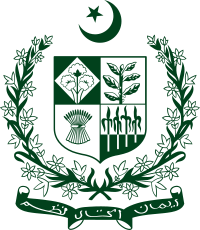
The districts of Pakistan are the third-level administrative divisions of Pakistan, below provinces and divisions, but forming the first-tier of local government. In total, there are 166 districts in Pakistan, including the Capital Territory, and the districts of Azad Kashmir and Gilgit-Baltistan. These districts are further divided into tehsils and union councils.

Blue Area is the central business district of Islamabad, Pakistan along the Jinnah Avenue. The area is a 2-kilometer (1.2 mi)-long corridor along Islamabad's Khayaban-e-Quaid-e-Azam, Islamabad's primary arterial road which leads up to the main government buildings. It is characterized by clean, wide roads and tall buildings among the panoramic greenery of the adjacent areas.

Mayor of Karachi is the executive of the Karachi metropolitan corporation and the Karachi local government system of the city of Karachi which is the third tier of governance in Pakistan after Federal and provincial governments.

The National Database & Registration Authority (NADRA) is an independent and autonomous agency under the control of the Interior Secretary of Pakistan that regulates Government Databases and statistically manages the sensitive registration database of all the National Citizens of Pakistan. Lieutenant General Muhammad Munir Afsar serves as Chairman of National Database and Registration Authority (NADRA) Pakistan.

History of the Jews in Pakistan goes back to 1839 when Pakistan was part of British India. Various estimates suggest that there were about 1,000 to 2,500 Jews living in Karachi at the beginning of the 20th century, mostly comprising Iranian Jews and Bene Israel ; a substantial Jewish community lived in Rawalpindi, and a smaller community also lived in Peshawar.

Overseas Pakistanis, or the Pakistani diaspora, refers to Pakistanis who live outside of Pakistan. These include citizens that have migrated to another country as well as people born abroad of Pakistani descent. According to the Ministry of Overseas Pakistanis and Human Resource Development, approximately 8.8 million Pakistanis live abroad according to December 2017 estimates. According to the Ministry of Emigration and Overseas Employment, data released in 2023 states that more than 10.80 million people have moved abroad since 1990.

Abdul Rehman Malik NI was a Pakistani politician and a Federal Investigation Agency officer, having served as the Interior Minister from being appointed on 25 March 2008 until 16 March 2013.
Alien registration was a system used to record information regarding aliens resident in Japan. It was handled at the municipal level, parallel to the koseki and juminhyo systems used to record information regarding Japanese nationals.
"Get AFM Greece - Complete guide". Lisbob. 2024-02-13. Retrieved 2024-04-05.
The Baháʼí Faith originated in the 19th century Persian empire, and soon spread into the neighboring British India, which is now Pakistan and other states. The roots of the religion in Pakistan go back to the 1840s, and it was recognized in the constitution of 1981 as a religious minority with legal rights. According to various sources, there are 2,000 to 87,000 Baha'is living in Pakistan.
Afghans in Pakistan are temporary residents from Afghanistan who are registered in Pakistan as refugees and asylum seekers. They fall under the jurisdiction of the United Nations High Commissioner for Refugees (UNHCR). Most of them were born and raised in Pakistan during the last four decades. Additionally, there are also Special Immigrant Visa applicants awaiting to immigrate to the United States.

Immigration to Pakistan is the legal entry and settlement of foreign nationals in Pakistan. Immigration policy is overseen by the Interior Minister of Pakistan through the Directorate General Passports. Most immigrants are not eligible for citizenship or permanent residency, unless they are married to a Pakistani citizen or a Commonwealth citizen who has invested a minimum of PKR 5 million in the local economy.

The Federally Administered Tribal Areas, commonly known as FATA, was a semi-autonomous tribal region in north-western Pakistan that existed from 1947 until being merged with the neighbouring province of Khyber Pakhtunkhwa in 2018 through the Twenty-fifth amendment to the constitution of Pakistan. It consisted of seven tribal agencies (districts) and six frontier regions, and were directly governed by the federal government through a special set of laws called the Frontier Crimes Regulations.

The Ministry of Interior is a Cabinet-level ministry of the Government of Pakistan, tasked and primarily responsible for implementing the internal policies, state security, administration of internal affairs involving the state.

The Computerised National Identity Card (CNIC) is an identity card with a 13-digit number available to all adult citizens of Pakistan and their diaspora counterparts, obtained voluntarily. It includes biometric data such as 10 fingerprints, 2 iris prints, and a facial photo. The National Database and Registration Authority (NADRA), was established in 1998 as an attached department under the Ministry of Interior, Government of Pakistan. Since March 2000, NADRA has operated as an independent corporate body with the requisite autonomy to collect and maintain data independently.

General elections were held in Pakistan on Saturday 11 May 2013 to elect the members of the 14th National Assembly and the four Provincial Assemblies. The three major parties were the Pakistan Muslim League (N) (PML-N) led by Nawaz Sharif, the Pakistan People's Party (PPP) led by President Asif Ali Zardari and the Pakistan Tehreek-e-Insaf (PTI) led by Imran Khan. Prior to the elections, the ruling PPP formed an alliance with the Pakistan Muslim League (Q) and Awami National Party, while the main opposition party, the PML-N allied with the Pakistan Muslim League (F) and Baloch parties. The PTI led by cricketer-turned-politician Imran Khan, also emerged as a key-player.
Electronic Government Directorate of Pakistan was established in October 2002 by the Ministry of Information Technology. In 2014 Directorate was merged with Pakistan Computer Bureau to form National Information Technology Board.
Somalis in Pakistan are residents of Pakistan who are of Somali ancestry. They are a small community of mainly students as well as some secondary migrants, most of whom arrived after the start of the civil war in Somalia in the early 1990s.

The Government Shipping Office is an agency in the Government of Pakistan that registers and manages sailors in the Pakistan Merchant Navy. The Government Shipping Office was first established in 1923 under the Merchant Shipping Act. It was a subordinate office of the then-Ministry of Communications, now reorganised as the Ministry of Ports and Shipping, under the administrative control of Ports and Shipping Wing, Karachi.

Seaman Service Book (SSB) is a continuous record of a seaman’s service. This document certifies that the person holding is a seaman as per the International Convention on Standards of Training, Certification and Watch keeping for Seafarers (STCW), 1978, as amended from time to time. Seaman Book is one of the compulsory document for applying crew transit visas. The record of employment on board of a merchant ship (sea service) is recorded in a Seaman Service Book. Different countries issue to their seafarers the similar service book with different names i.e. Seaman Record Book, Seaman Discharge Book etc.











